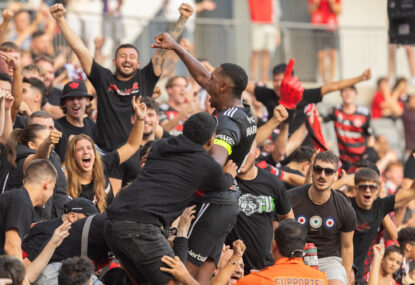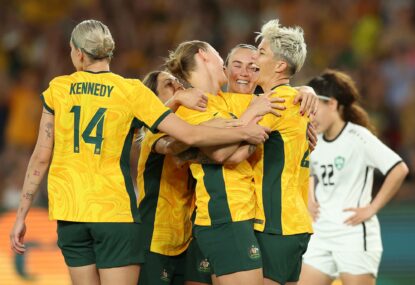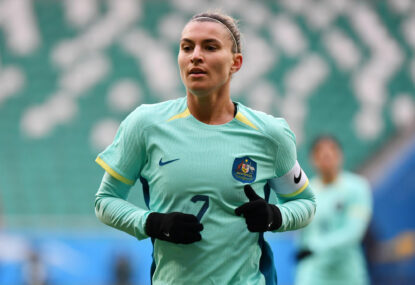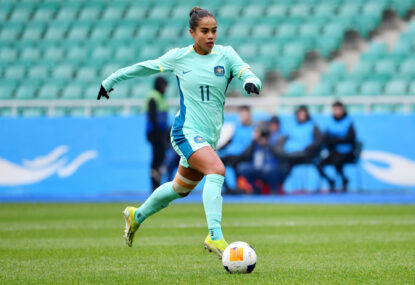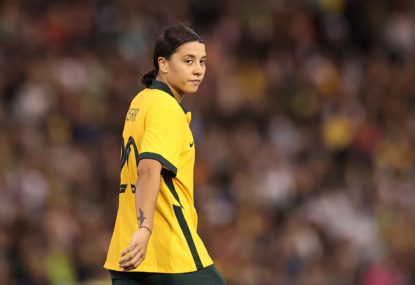The Matildas have issued a call to arms ahead of the Women’s World Cup, urging FIFA to put their money where their mouth is and deliver equal prize money.
All 23 squad members speak line-by-line in a video from players’ union Professional Footballers Australia (the PFA), where they also push for rival nations to have “the basic right to organise and collectively bargain”.
The video is reminiscent of the Socceroos’ human rights push before the 2022 men’s World Cup in Qatar.
“Collective bargaining has allowed us to ensure we now get the same conditions as the Socceroos, with one exception,” midfielder Tameka Yallop says in the video.
“FIFA will still only offer women one quarter as much prize money as men for the same achievement.”
The Matildas’ and Socceroos’ collective bargaining agreement with Football Australia guarantees each team the same minimum percentage of prize money from tournaments.
But the overall World Cup prize pools sit at US$110m for women and US$440m for men.
“While prize money has advanced, it’s still only 25 per cent of what the men get, and FIFA are championing that that’s equality and there’s still no assurance that there will be equality,” PFA co-chief executive Kate Gill told AAP.
“There’s a few weasel words in their commentary around the broadcast and the sponsorship mixture having to be right before they can move to that.
“They’ve clearly got $4 billion in reserves, so they can afford to spend and equalise things now.
“So it’s a call to arms and also the players understanding that their power is in their collective and in their solidarity.”
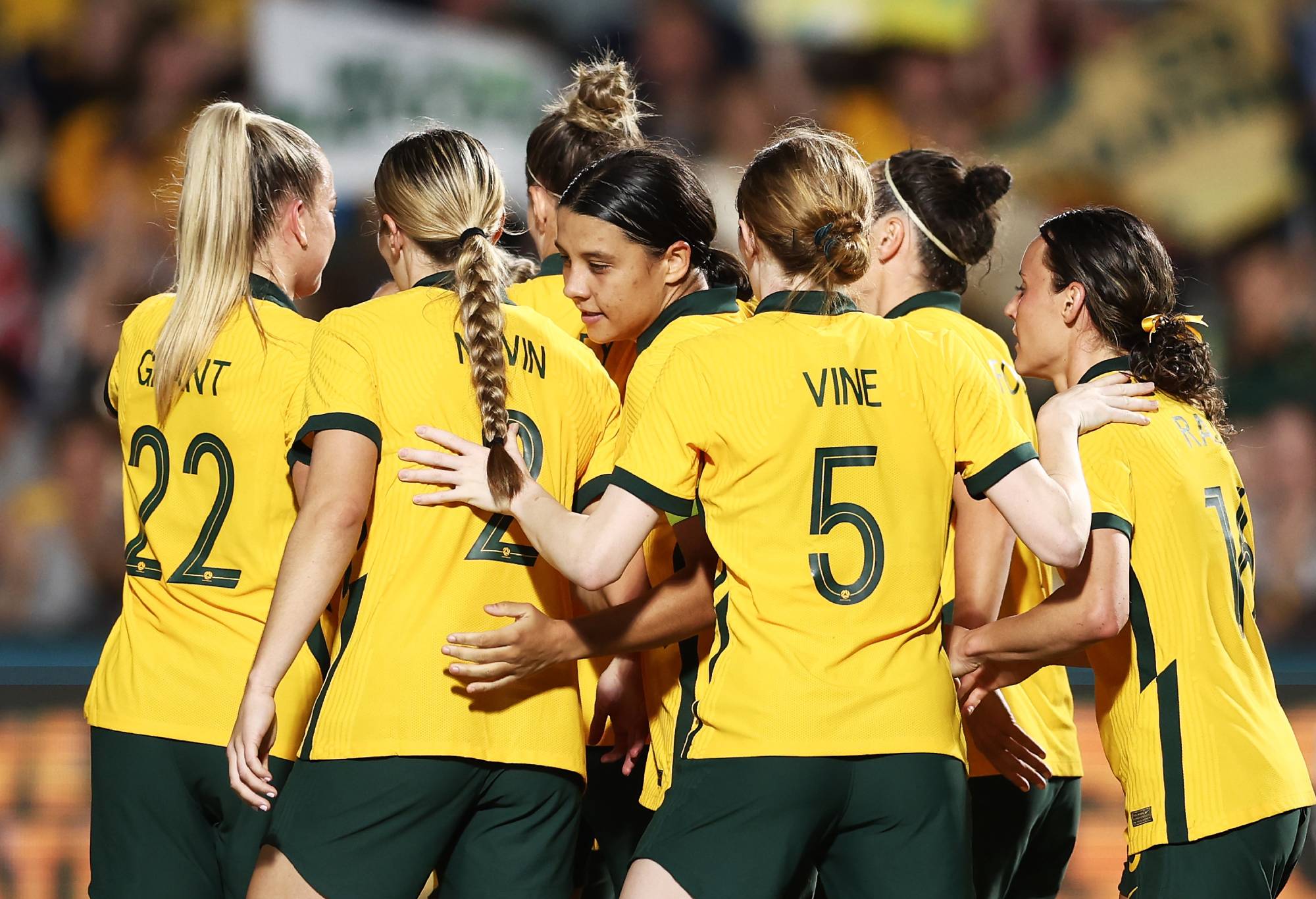
Sam Kerr of the Matildas celebrates with teammates (Photo by Matt King/Getty Images)
Defender Alanna Kennedy hoped the video could help other nations earn collective bargaining rights.
Most countries at the World Cup don’t have CBAs, while countries including Canada, Nigeria and England have struggled to reach agreements with their federations, including on pay disputes.
“We wanted to have a voice in something bigger than football and for us, leaving a legacy is something that is, as much as we want to perform on the field, I think the off-field stuff is important as well,” Kennedy said.
“As a collective between ourselves, the PFA and the FA, we’ve made huge steps forward for women’s football in Australia.
“Just shining some light on that and being able to, I guess, encourage other countries globally to push forward for more for our sport.”
The video cites players reflecting on early Matildas earning CBAs, which included the right to not have to wash their own playing kit.
Several of the current Matildas went on strike for better pay and conditions in 2015.
The video includes thinly-veiled messages to FA and the A-Leagues, urging those “those who run the game” to provide opportunities for women and girls and those in positions of power to help “make women’s football as big as it can be, here and around the world”.
FA chief executive James Johnson on Monday afternoon noted the current CBA included equal conditions between the Matildas and Socceroos and “had set a great example for the rest of the world”.
He noted FIFA prize money had come a long way but still had room for improvement.
The current Matildas CBA has been extended until the end of the Women’s World Cup, with discussions expected to pick up post-tournament.]
Spain in haka trouble
Spain captain Ivana Andres has apologised after a video of her teammates laughing as they attempted a haka drew ire in New Zealand ahead of the Women’s World Cup.
The Spanish players were accused of being disrespectful to Maori culture over the video, which has since been deleted.
Andres asked for forgiveness from the local Rangitane tribe at a traditional ceremony to welcome guests.
“We’ve only been a few days in Aotearoa New Zealand and there’s still much to learn about this culture,” she said in Spanish, with local media provided with a translation.
The Real Madrid centre back asked for “forgiveness for our mistakes” and vowed her team would strive to be “better each day”, as she presented the tribe with a Spain jersey.
A Rangitane spokesperson told reporters that what happened at the ceremony “was a very good outcome”.
“Their words came from the heart and there was an acknowledgement that they understood the haka is very precious, not only to Maori, but to all of Aotearoa.”
Spain play their Group C matches in New Zealand, opening their campaign on Friday when they face Costa Rica in Wellington before taking on Zambia and Japan.
Kiwi interest lagging
If Australia has Women’s World Cup fever, New Zealand may just have a cold.
An enthusiasm gap has emerged between the two co-hosts for the tournament, which kicks off in Auckland and Sydney on Thursday night.
Australian energy is built off the Matildas, led by superstar Sam Kerr, who are fresh from beating France last week for their fourth win over a top-six nation in the past year.
While the Matildas have every chance of a deep run, the underdog status of New Zealand’s Football Ferns means the tournament hasn’t caught the imagination of many Kiwis.
The battling Ferns have never won a World Cup match, and were on a 10-match winless run until last week’s final hit-out against lowly Vietnam, which they won 2-0.
That match sums up the disparity between the experiences of the two countries.
The Matildas set an attendance record with more than 50,000 at Melbourne’s Marvel Stadium on Friday for their last pre-tournament match.
New Zealand played their game in regional Napier in front of 6215, an official crowd figure which appeared generous.
Local media are not as enthusiastic about the Football Ferns or the tournament – the biggest sporting event of 2023 and the biggest women’s event of all time – than they are about the all-consuming All Blacks.
The NZ Herald, the country’s largest daily newspaper, failed to feature a single story about the FIFA event in its print edition last Thursday, a week from kick off.
As of last week, FIFA confirmed some 300,000 tickets had been sold in New Zealand, well short of the nearly one million in Australia.
Roughly one-third of New Zealand’s available tickets have been sold, with games hosted in Auckland, Wellington, Hamilton and Dunedin.
Local leaders have appealed to Kiwis to buy their tickets.
Prime Minister Chris Hipkins began his weekly press conference with a pitch to back the “once-in-a-lifetime” tournament.
“I encourage New Zealanders to really get behind it … it would be great to see a full house for as many games as possible,” he said.
Sport Minister Grant Robertson told AAP he didn’t believe the massive scale of the tournament may not have resonated with Kiwis yet.
“People don’t realise that this is a tournament where nearly two billion people will watch. And what an opportunity for New Zealand for football and for women and girls,” he said.
Ticket give-aways are now being conducted for lower-drawing fixtures including Zambia-Japan and Spain-Costa Rica.
The group stages of the tournament are split equally, with 16 teams based either side of the Tasman as they aim to progress to the knockout rounds.
Australia’s larger population and greater diaspora communities have helped sales, though New Zealand has one major drawcard: the United States.
The US is the two-time world champion and tournament favourite and will attract a huge travelling fan contingent.
While Hotel Council spokesman James Doolan likened demand to “a steamboat, not a jetboat”, Tourism Industry Aotearoa (TIA) was more positive on the tournament.
TIA chief executive Rebecca Ingram said hosting the tournament would provide a double boost for her members, both through bookings in the normally slow winter months, and through the exposure that would help into the future.
“Having this demand at a traditionally quiet time of year is very valuable,” she said.
“Major events bring significant profile opportunities for New Zealand that will benefit tourism for months to come. The tournament is the third largest in the world for reach and the broadcast value and media attendance will be gold for New Zealand.”
The tournament is the third successive Women’s World Cup to be hosted in New Zealand, following last year’s cricket ODI event – won by Australia – and rugby tournament.
© AAP






























































































